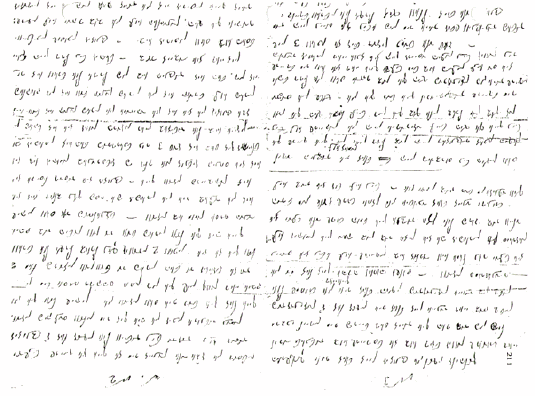
Return to Vishnevo Stories Menu
Zev-Wolf came from the town of Vishniveh. He and his wife, Basha-Ita
Danishevsky had four children: Max, Philip, Libby-Duska and Rivka-Baila.
Zev-Wolf was a teacher, and all of the children were raised Orthodox and
steeped in Torah learning and Yiddishkeit -- in the true "Litvak" tradition.
Basha-Ita died when Rivka was only a year and a half old. Zev-Wolf married
Esther Genya, who was a wonderful stepmother to the children.
By 1916, all of the family but Zev-Wolf, Esther Genya and youngest daughter
Rivka-Baila had emigrated to America. The three older children worked in
upstate New York to save enough money to bring the rest of the family to the
New World. During this time, Zev-Wolf wrote many letters to his children in
America, all written in his beautiful Yiddish script.

Yiddish letters written by Zev-Wolf, c. 1910
While waiting for passage, Zev, Esther and Rivka were caught in World War I
and the Russian Revolution. Four years passed with no contact from their
family in America.
With much of the population in the war torn cities starving, Esther Genya
traveled alone to her family farm to bring back milk and provisions. Caught
in the ravages of war, she disappeared and was never heard from again.
Rivka-Baila and her father became refugees and were moved from place to place
as the wars progressed.
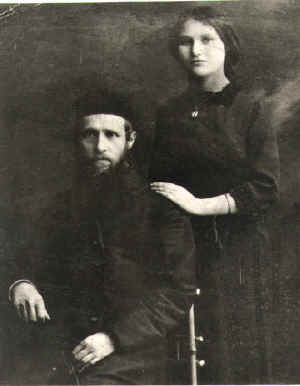
Zev-Wolf Podbereski and daughter Rivka-Baila Ilya, Lithuania, Vilna Gebarnia
c. 1915While at an armory where they sought shelter, Zev-Wolf became
seriously ill and his condition continued to worsen. Rivka-Baila knew he
needed a doctor and went to a neighboring village to get help. When she
returned a few days later, her father was gone. She searched a makeshift
morgue where she found his body amid hundreds of others who had died from
disease and starvation during the long Russian winter. She buried her beloved
father in the snow. Terrified and now alone, Rivka-Baila had only one thought
" to get to America. Hearing about a Jewish Delegation in the free port of
Danzig, she began her journey across Poland on foot. Rifka-Baila had no
passport. As a war refugee, she was stateless. She learned of a family in
Wizen who had room on their family passport for one more person. Rivka joined
this family and together with a brother and sister who were also travelling
alone (Laike and Joseph Sherman), she crossed Poland, working occasionally on
farms and sleeping outdoors or in barns.Arriving in Danzig, they waited along
with hundreds of other refugees for their names to be called from lists of
relatives providing passage to America.
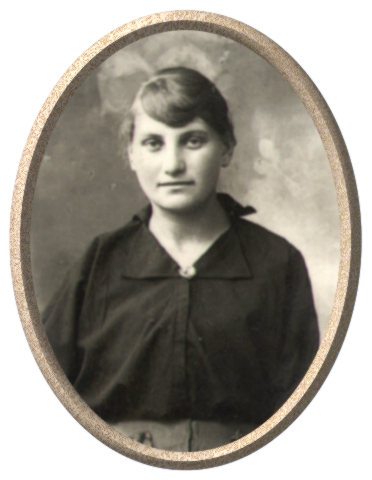
Rivka-Baila in DanzigIn 1920,
Rikva-Baila Podbereski trade;s name was called and she boarded the Susquehanna --
the ship that would take her to the New World. Along with thousands of Jewish
refugees, Rivka-Baila made the long ocean voyage in the cramped,
claustrophobic conditions of Steerage Class.
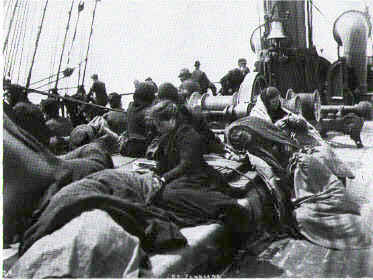
The Voyage to the New World
Aboard Ship Rivka-Baila arrived in America on Yom Kipper, 1920. Reluctant to
travel on Yom Kippur, she nonetheless boarded a train to join her brothers
and sister in Rochester, New York. Although fluent in Russian, Polish and
Yiddish and excelling in mathematics, the only work Rivka could find was in a
coat factory, sewing buttons. One day at work, a co-worker, admonishing her
for being old fashioned and Orthodox, spilled milk on her lunch making it
un-kosher, and therefore not edible. A young man named Joseph Martin Schuster
kindly offered her an orange. They were married in 1922.
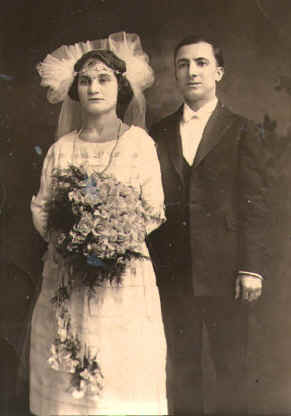
Wedding of
Rivka-Baila Podbereski & Joseph Martin Schuster, June 4, 1922.
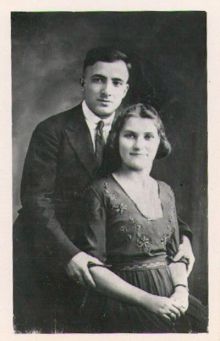
Engagement of Rivka-Baila Podbereski & Joseph Martin Schuster, 1921.In 1924,
their first child was born: Basha-Ita (Beatrice Edith), named after Rivka’s
mother. They had 3 other children, Burton Gordon, William (named after her
father, Zev-Wolf) who died in infancy, and Alan Herbert.Â
Beatrice Edith Burton Gordon Alan Herbert